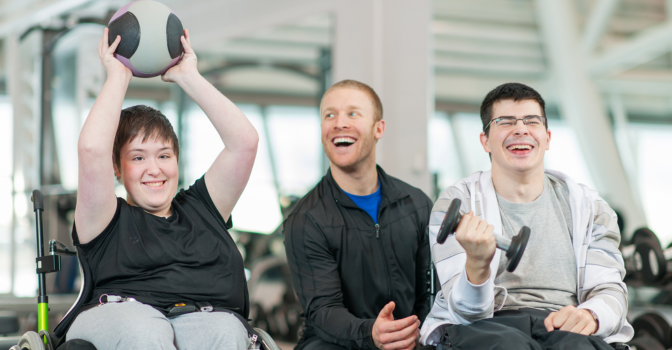Physiotherapists can help you to be more active, move better and manage pain. They can also support participation in sports and recreation activities.
Physiotherapists work with people of all ages and abilities and can assist with a range of different conditions, including brain injury, cerebral palsy, stroke recovery, physical disabilities and neurological disorders.
Today, we’ll look at when the NDIS will cover physiotherapy treatment and how physiotherapy might be able to help you achieve your goals.
What does a physiotherapist do?
A physiotherapist can provide treatment and show you techniques to improve your mobility, posture, strength and balance.
They will ask you questions, look at how you move and tailor treatment or activities to your individual needs. Any treatment plan will consider your abilities, lifestyle and overall health.
Physiotherapists use various techniques and treatments that can include:
- Assessing posture, muscle tone, mobility and strength
- Joint manipulation and massage
- Exercise programs
- Stretches
- Breathing exercises
- Acupuncture
- Hydrotherapy (exercises in a pool)
- Showing others how they can assist
- The use of special equipment and assistive technology.
There is a good chance that when you go to a physiotherapist, you’ll get homework! Physiotherapists will often demonstrate exercises at home to help you move better, be more independent or manage pain.
Physiotherapists work closely with doctors and other allied health professionals such as speech therapists, occupational therapists and psychologists.
How can a physiotherapist help you?
Physiotherapists can help people with a disability to become more independent and maximise the functioning of joints and muscles.
Better posture
Posture is how you hold your body when you sit or stand. How you sit and stand can impact breathing, muscle growth and mobility. Physiotherapists can teach you new postural skills and avoid the long-term effects of poor posture.
Daily activities
Physiotherapists can assist you or someone you care for with everyday tasks, such as getting out of bed, showering and moving around the home.
Depending on your level of ability, this may include:
- Improving muscle strength and motor skills so you can do things yourself
- Showing others how they can assist
- The use of specialised equipment.
Sports and hobbies
Participating in sport and leisure activities or hobbies is important for health and wellbeing. Physiotherapists can provide support to participate in your chosen activities and live a more active life.
Mobility aids
Physiotherapists play an important role in identifying aids and appliances that support you to live more independently including canes, wheelchairs, scooters, bathroom and toilet aids and ramps. They’ll ensure you have the right equipment, teach you how to use it safely and show you techniques to prevent falls and injuries.
Early intervention
Physiotherapists are often part of an early intervention team for babies and young children with a disability, assisting in the development of motor skills like balance, sitting, crawling and walking.
Rehabilitation
Physiotherapists are specialists at helping people recover from injury or surgery and are often recommended as part of an after-hospital care program.
The NDIS and physiotherapy.
The NDIS may cover physiotherapy if the need is directly related to a disability, will assist you to meet your goals and covers the reasonable and necessary test (read more about What is reasonable and necessary?).
Physiotherapy comes under the Improved Daily Living category of the NDIS Capacity Building budget.
This category is designed to provide assessment, training, supports or therapy to assist you in developing skills to increase independence. It also covers a wide range of therapies, often provided by allied health services, like physiotherapists.
While physiotherapists can assist with many things, the services they provide often relate to improving movement and mobility. They also teach techniques for improving breathing.
When doesn’t the NDIS cover physiotherapy?
If the need to obtain physiotherapy treatment is not directly related to your disability, then it will not be covered.
While the use of physiotherapy can be effective as a pain management strategy, it may only be covered by the NDIS if the pain is caused by a disability, not by other conditions.
Be aware that, depending on the circumstances, the NDIS may not fund physiotherapy required for rehabilitation after surgery. This service may be provided through the health system instead.
Physiotherapy and achieving your goals.
The use of funding for any NDIS budget category needs to relate directly to your goals.
The types of goals that physiotherapy might be able to assist with include:
- Becoming stronger so that you can do more things for yourself
- Improving mobility so you can move more independently
- Developing muscle tone and balance so you can learn how to do something new, like ride a bike
- Managing or reducing pain to help you live a more active and sociable life
- Teaching new exercises so you can become fitter and learn a new sport.
Leap in! can help you achieve your goals.
The Leap in! Crew helps people to navigate the NDIS and achieve their goals. If you think physiotherapy could be beneficial for you, we can put you in touch with a physiotherapist in your area.
Check out our Provider Network Directory or call us on 1300 05 78 78.
Originally published on 11 December 2019, updated on 5 July 2023.

